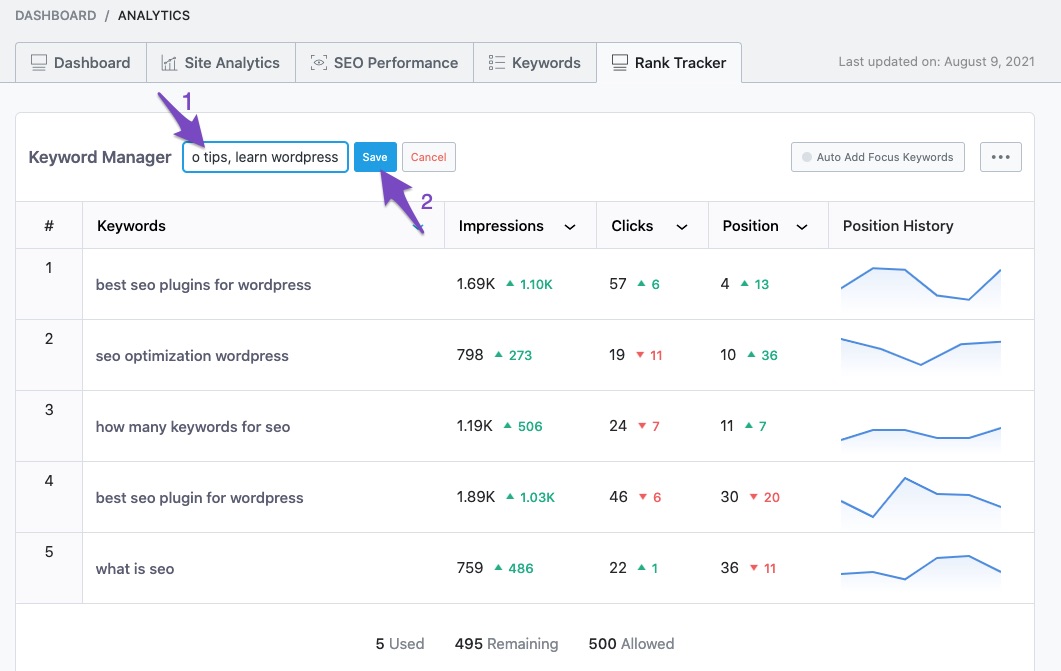In the digital age, where every click counts, understanding the significance of keywords becomes paramount. Keywords are the foundation of search engine optimization (SEO), guiding potential customers to your content. A keywords tracker is an essential tool that helps businesses and individuals monitor their keyword rankings, understand search trends, and optimize their content for better visibility. With competition intensifying in every niche, leveraging a keywords tracker can make all the difference in driving traffic to your website.
The importance of tracking keywords lies not just in knowing where you stand but also in adapting to the ever-evolving landscape of search engine algorithms. A good keywords tracker provides insights into which keywords are working for you and which need improvement. This data allows you to refine your content strategy, ensuring that you are always in touch with what your audience is searching for. In turn, this can lead to increased organic traffic, higher conversion rates, and ultimately, more revenue.
Moreover, utilizing a keywords tracker can unveil hidden opportunities that competitors might be capitalizing on. By analyzing their keyword strategies, you can identify gaps in your own approach and pivot accordingly. The world of SEO is not static; it requires continuous adaptation and innovation. This article will explore the ins and outs of using a keywords tracker, answering essential questions and providing valuable tips to maximize your SEO efforts.
What is a Keywords Tracker?
A keywords tracker is a specialized tool that monitors the performance of specific keywords over time. It tracks how these keywords rank on search engines, allowing users to understand their visibility in search results. By using a keywords tracker, businesses can gain insights into their SEO performance, track their competitors, and identify trends in user behavior.
How Does a Keywords Tracker Work?
Keywords trackers function by collecting data from search engines regarding the rankings of targeted keywords. Here’s how they generally work:
- Input your target keywords into the tracker.
- The tool regularly checks search engine results pages (SERPs) for those keywords.
- It compiles data on your rankings, as well as the rankings of competitors.
- Reports and analytics are generated to help you interpret the data.
Why is Tracking Keywords Important for SEO?
Tracking keywords is crucial for several reasons:
- **Visibility**: Understanding where your content ranks helps improve visibility on search engines.
- **Performance Measurement**: It allows you to measure the effectiveness of your SEO strategies.
- **Competitor Analysis**: Tracking competitors' keywords can help you identify areas for improvement.
- **Content Optimization**: You can tailor your content based on trending keywords.
What Features Should You Look for in a Keywords Tracker?
When choosing a keywords tracker, consider the following features:
- **Real-Time Tracking**: Look for tools that provide real-time tracking for immediate insights.
- **Competitor Analysis**: The ability to analyze competitors’ keywords is invaluable.
- **Historical Data**: Access to past rankings can help you spot trends over time.
- **User-Friendly Interface**: A simple interface makes it easier to navigate and understand data.
- **Integration Capabilities**: Check if the tool can integrate with other SEO software.
How Can a Keywords Tracker Enhance Your SEO Strategy?
Utilizing a keywords tracker can significantly enhance your SEO strategy in various ways:
- **Data-Driven Decisions**: Make informed decisions based on real-time data.
- **Keyword Expansion**: Discover new keywords to target for content creation.
- **Performance Monitoring**: Continuously monitor your SEO performance and make necessary adjustments.
- **Targeting Long-Tail Keywords**: Identify and target long-tail keywords that can drive niche traffic.
What Are Some Popular Keywords Tracker Tools?
Several tools are available for tracking keywords effectively:
- SEMrush: Comprehensive SEO tool with robust keyword tracking features.
- Ahrefs: Known for its extensive keyword database and competitor analysis.
- Google Search Console: Free tool that offers keyword performance insights directly from Google.
- Moz Pro: Provides keyword tracking along with a suite of SEO tools.
- Ubersuggest: Offers keyword suggestions and tracking at an affordable price.
How to Use a Keywords Tracker Effectively?
To maximize the benefits of a keywords tracker, consider the following tips:
- **Set Clear Goals**: Determine what you want to achieve with your keyword tracking efforts.
- **Regularly Update Keywords**: Keep your target keywords updated based on trends and performance.
- **Analyze the Data**: Take time to analyze the data provided by the tracker to make informed decisions.
- **Experiment with New Keywords**: Don’t hesitate to test new keywords based on evolving trends.
Conclusion: Is a Keywords Tracker Worth the Investment?
In conclusion, a keywords tracker is an invaluable tool for anyone serious about improving their SEO efforts. Its ability to provide real-time data, analyze competitor performance, and identify trends makes it essential in today’s competitive online landscape. By investing in a keywords tracker, you can take your SEO strategy to the next level, ensuring that your content reaches its intended audience and drives traffic to your website. Ultimately, the insights gained from tracking keywords can lead to better decision-making, enhanced visibility, and greater success in achieving your digital marketing goals.
Exploring The Thrill Of The Fan Bus Experience
Unveiling The Lives Of Adriana Lima's Daughters
Mastering Your Online Presence With A Keyword Position Tracker


